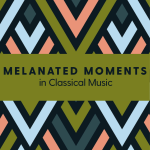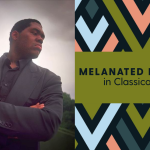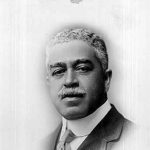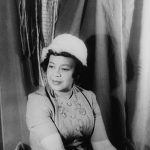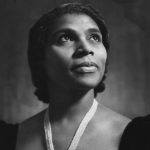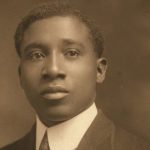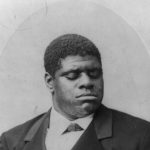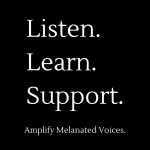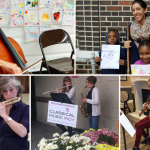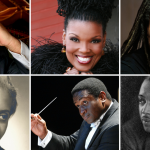MMCM S3E1: Composing a Culture with Rosephanye Powell
Angela and Joshua explore the global and diasporic works of Rosephanye Powell and speak with the artist herself. Our co-hosts discuss Rosephanye’s approach to arranging, how to avoid cultural appropriation while honoring the roots of cultural inspiration, and why presenting a story can help diverse audiences understand music derived from the Negro spiritual. We’ll hear works performed by the Eastman Chorale, VocalEssence, and the Philander Smith Collegiate Choir.
Featured Music:
“Sorida,” performed by the Philander Smith Collegiate Choir
“Sometimes I Feel Like A Motherless Child,” performed by VocalEssence
“The Word Was God,” performed by the Eastman Chorale
“Harambe”
Joshua Thompson: Before we get started with this episode, we wanted to thank everyone for your amazing support of this podcast. As our podcast community grows, we have added resources for each episode. So just visit our website to access blog posts and transcripts for each episode, or follow us on social media and email us anytime with your podcast suggestions, to melanatedmoments@classicalmusicindy.org. Angela Brown: Hey everybody. Welcome back to Melanated Moments in Classical Music. I’m Angela Brown. Joshua Thompson: And I’m Joshua Thompson. You know, we are so excited to bring you back for a third season and a season I might add, with a grand array of music that is for, by, and about Black people. Angela Brown: You got that right, Mr. Joshua, it has been great fun to dive into music that has been enlightening and thrilling to program. Especially music and music-makers that have not always had the spotlight shown on them. Joshua Thompson: Now Auntie Angela, you know I feel you on that, which is one of the reasons why I really wanted to do this show in the first place, so that everyone will be given fair footing and have the opportunity to strut their respective stuff, so to speak. A little strut action never hurt anybody. With that being said, I know for a fact that you have an exciting subject and person to introduce us to today. So who is it? Angela Brown: Oh, nephew, Joshua, I sure do. Today, we are going to have the opportunity to interview the one and only, Ms. Rosephanye Powell. Rosephanye Dunn Powell has been hailed as one of America’s premier composers of choral music. She has a diverse and impressive catalog of works published by some of the nation’s leading publishers. Her compositions include sacred and secular works from mixed choruses, women’s chorus, men’s chorus and children’s voices. Her style of composition has been characterized by beautiful melodies, strong rhythmic emphasis, rich harmonies, often derived from African-American popular styles and varied vocal textures, including counterpoint. Her influences include African-American musical styles, the choral works of J.S. Bach, G.F. Handel, Mozart and Verdi. The art songs of William Grant Still, which I know you’ll be interested in talking to her about, Undine Smith Moore, Fernando Obradors, Samuel Barber, Emmanuel Chabrier, and the spiritual arrangements of H.T. Burley, J. Rosamond Johnson, William Dawson, Hall Johnson, Lina McLin, and Roland Carter. Powell’s works are popular throughout the world, especially in Europe and Asia. She is in constant demand as a composer in residence, clinician, adjudicator, conductor, and performer. Prior to her career, as a composer, Powell invested most of her energy performing art song and literature recitals dedicated to the works of William Grant Still, Dean of the African-American composers and the interpretation of African-American spirituals. For a period, she had a weekly radio segment, “Living History,” on the nationally syndicated, “The Donnie McClurkin Show”, where pal provided the listening audience with brief moments of Black music and history. Let’s give a warm welcome to my sistah friend, Miss Rosephanye Powell , girl come on in the room! Rosephanye Powell: Thank you , thank you so much. I am truly looking forward to this journey today. I just love your podcast and I’m just honored to be here because what I love about you and Joshua, is how you all just keep it real. Angela Brown: [Laughter] Yeah, we do. Rosephanye Powell: So, I’m really looking forward to this. Angela Brown: Yes ma’am. I tell you, Ms. Rosephanye, you don’t know, but I found out about you through my agent, Janet Jarriel. She told me about you and I listened to your music and I’ve been hooked ever since. And she says, “Angela, you have got to have Rosephanye on Melanated Music.” And I’m so, so happy that you’ve been able to join us. Rosephanye Powell: Well, I haven’t met her, but I love her already! Angela Brown: Because she loves you. I tell you. So, first question. Now, how did you become interested in choral composition? I mean, do you compose and arrange for solo voices as well? Rosephanye Powell: Uh, I do compose for solo voices as well, but you know, growing up, first of all, playing for my church choir and, singing with a gospel female quartet in high school, then going to an HBCU where we sang spirituals and did performances all of the time, even though, I pursued degrees in solo performance. Everywhere I went, I was with the choir. And so naturally, being a part of this community of voices impacted the focus of my composition. My husband is a choral conductor so, serving along with him and composing for his choirs naturally, I was composing for choirs. Angela Brown: Wow. And that was a question that we were going to have later on in the interview that we wanted to know about, your husband, Mr. William. Well, since you done brought it up, how did y’all meet? Rosephanye Powell: Well, actually we met at Alabama State University in Montgomery, Alabama in HBCU. We were both music majors there and all through our undergraduate studies, we were just friends. And then I went to Westminster Choir College to work on my master’s, he went to Morgan State, we got away from each other and realized, wow, we don’t really miss anybody from Alabama State except for each other. Angela Brown: Aw! Rosephanye Powell: We made that connection and then we’ve been on a journey together ever since. Angela Brown: Oh, that is beautiful. Joshua Thompson: That’s special. So it truly was a teamwork type of approach to your relationship and probably to music in general, is that correct? Rosephanye Powell: That is correct. You know, when we first got together, we had to learn how to work together. Angela Brown: I bet you did. [Laughter] I want to get back in there, ’cause we’re gonna come back to that, but, it seems like the perfect time to get one of your pieces in here called “Sorida.” Rosephanye Powell: Oh yes. Well, “Sorida” actually is one of those songs that was originally written, composed for one of my husband’s choirs. For Philander Smith Collegiate Choir in Little Rock Arkansas. We were doing a CD that we were- we had to compose all the works for the CD because we didn’t have the money to pay for licensing. And so I wanted to do an African song, and so I thought about, I went looking in this collection and there was Sorida, and it is a greeting in Zimbabwe, that is of the Shona language and is indicative of Yambo Or Shalom in the Israeli language. So, this song says, “Greetings, my brother greetings my sister, we’re all one community.” And so when we greet each other, our greeting is not just one to say, “Hello, how are you doing?” It’s to say, “We are family.” Angela Brown: Well, come on, come on in the room, family, lets listen to Miss Rosephanye Powell’s “Sorida.” Speaker 4: [Rosephanye Powell, “Sorida”] Angela Brown: Sorida! Woo, yes! Joshua Thompson: I love this. First of all, so Angela was like, “You’re going to play this on a loop and on a loop.” And she’s right, it’s such an ear worm. And I envisioned myself, and I’ll probably do it later today, barefoot in my grass just like twirling in the sun- Angela Brown: Yes! Joshua Thompson: [Laughter] Because it gives me that. But Rosephanye, Ihave a question for you. I love that we’ve started this out because this is a welcome, so welcome to the melanated multi-verse of music, but there’s gotta be some strategy and some research that goes into this. You’re introducing the diaspora of which Zimbabwe is included, it’s people and it’s language, but you’re not appropriating anything. You’re doing this in a very organic, natural and sincere way. What does that process in writing and conceptualizing kind of a, if not a new age spiritual, a new age diasporic Anthem. Rosephanye Powell: You know, that’s that’s really a great question, Joshua. Because normally, what I’m trying to do is take, whether it’s a language or a word or a piece of poetry, and personalize it. So, this particular song, “Sorida,” is actually part of a children’s game in Zimbabwe. And in this particular game, they take the word Sorida and they repeat it, doddy dah, doddy dah. And as the kids are moving their bodies, they’re learning not only the greeting in the playfulness of the game, they’re learning to develop their rhythmic rhythms cause they use handclaps and all of that in it. So what I wanted to say was, we as Americans – which is why I didn’t try to go add any more African words to it – I wanted to say, wave to your sister, wave to your brother. For me, in my mind, I saw this as this is the greeting anybody from any country, any nation, can use to greet people. So, this song has been sung all over the world because even though it has as its foundation, Zimbabwe, I took those words and then I put them into my African-American-isms. Joshua Thompson: Right, right. Angela Brown: Yes. Joshua Thompson: It’s done brilliantly. And you will find out, when I’m not thinking, I’m overthinking. So, thank you for helping me to strip that away and be like, “Yo dude, it’s just music. You just take a [inaudible].” But it’s really smart. And it’s captivating for the audience. It just, it really is. This was gorgeous and I love this one so much. This was good, this was really good. Angela Brown: So now, because what I heard you say is kind of how I approach my classical music. I grew up in the church and I don’t try to put the sensibilities of Verdi or Mozart into my, my music-making. I use the, what I have innately in me and put it into the music so that it’s always understood, regardless of what genre I’m singing, you will hear grits and greens. You will hear Angela. Joshua Thompson: [Laughter] Grits and greens. Angela Brown: You will hear my background. You will hear all of that. And I love that you do that with your music. Rosephanye Powell: Thank you. Yeah. So, and with this particular song, like I’m, I’m saying, you know, a lot of non-Black singers, they’re worried about appropriation and a lot of them, even- actually, I remember when I performed with an African ensemble at Florida State, a lot of the African rhythms, we felt them the total opposite from what they will play as Americans. And so another part of that was just the choral world at this time was really trying to be more multicultural. This was kind of like an introduction into layering rhythms on top of rhythms with just that small amount, you just got that one word, Sorida, but you’ve got the interpretation and you’ve got some of that contrapuntal writing going on within it. Then, you’ve got the drumming, which is part of the African culture. But so much of that was coming from my rhythms as an African-American. So thank you all for, for selecting this particular song because I think it does speak to how we can take parts of other cultures without appropriating them and not bringing shame to them. Angela Brown: Exactly. Rosephanye Powell: You know, I mean that’s my hope. Joshua Thompson: Spot on. There’s a colleague contemporary of ours, prolific choral writer, Rollo Dilworth, speaks a lot on the difference between cultural appropriation and appreciation. And this one squarely puts you in the latter, which I think is awesome. And it’s a wonderful blueprint for how to not overthink and just do it. [Laughter]. Rosephanye Powell: Thank you. Joshua Thompson: So we have this, this diasporic kind of macro thing, but you’ve mentioned a couple of times how you’re infusing, what you know, which is that African-American spiritual. Angela, do you think this is a good setup to get to maybe what we would consider a more traditional choral work that shows another part of Miss Powell’s prowess as a composer? Angela Brown: Certainly. There is a song that, um, I actually had the opportunity to sing with. We’re not using that particular recording though, Rosephanye, but it’s called “The Word Was God.” Can you tell us about your inspiration for this one? Rosephanye Powell: Well, you know, “The Word Was God,” actually came about one day, I was, at Philander Smith College and we were thinking about doing this first CD and again, we were contacting publishers and they were asking us rightly for sending us contracts for licensing, which we couldn’t afford. We were actually going to sell these CDs for- to raise for scholarships for the singers. And it just came to my mind, ’cause I had arranged songs in my undergraduate years for friends and for groups, and I just said, “Hey, I’m going home and I’m going to compose a song”. Now I know it came from God, but this is just what was in my head. I drove home, drove to our apartment. And, I remembered that I had heard in a workshop that, you know, if you’re a beginning composer, its best to find works that are in the public domain or the Bible. So I pull out my Bible and it comes to John 1:1 “In the beginning was the Word, and the Word was with God, and the Word was God. The same was in the beginning with God, nothing was made, He has not made in the beginning was the Word.” And so I just kept saying that over and over, “In the beginning was the Word, and the Word was with God. And the Word was God. The same was in the beginning with God…” And so I just kept speaking that rhythm over and over, and all of a sudden I started hearing that line overlap with different entrances of the same line. And so I started writing, I didn’t have staff paper, I just took out a piece of copy paper, drew five lines- Angela Brown: Alright now! Rosephanye Powell: You know, writing out the notes, and it started coming faster than I could actually write. And so I took out my recorder and I started singing the parts to hold on to, you know, the different parts. You know? So that was the A section where God first starts creating, the world is very simple. It’s just two lines, very sparse. And then the song develops with all the parts coming in, speaking that same line, “The same was in the beginning with God.” Then there’s the B section where it talks about Christ being the Word, all things were made by Him, nothing was made, He has not made well, I have the guy, the tenors overlapping with the sopranos in a more lyrical way with the basses, given such, more like a drone, again, the engine of the voice of God creating. Then we come to the last section where the basses and the baritones begin with “All things were made by Him.” That was the the beginning of God’s voice creating. And then after the basses start that drone, that engine, like the engine, the purring of a car, the second tenors come in, “In the beginning was the Word, was the Word.” Then, the second time, the first tenors come in, then there’s a third entrance, which is the second altos, a fourth entrance, which is the first altos, then a fifth entrance, which is the second sopranos, then a sixth interest, which is the first sopranos. And then everybody’s in on the seventh entrance:”It is because God rested.” Joshua Thompson: She just broke this whole thing down! Angela Brown: She broke it down! I’m so excited. Oh my goodness. Let us sit back and listen to this melodic stew, “The Word was God.” Music Plays: [Rosephanye Powell, “The Word was God”]. Angela Brown: And there you have it, “The Word was God.” I tell you, my mother would always say to me, “Angela, thoughts are things.” And by you jumping in your car saying, “Okay, I can’t afford this licensing fee. So I need to go home and write something.” First of all, you had the thought. And God knit that thing together. And you say this was your first piece? Rosephanye Powell: Yes, this was my first composition. And, the first one that was published, yes. Joshua Thompson: Listen, not bad for first time out the gate. Unison: [Laughter]. Rosephanye Powell: Thank you. Joshua Thompson: Seriously, you’re doing so many things with this. It recalls… Just the purpose of communal singing. You know, singing in the round, the layers and the building seven being that divine number, but also from the last piece that we heard too, it’s this incantation, it’s the syncopation and this rhythm juxtaposed with this melody that makes this style of music, what it is. And you’ve just done it again without overthinking and just letting it evolve and progress as it’s supposed to. And then it kind of wraps up the same way. It’s concise. It’s to the point. And it’s, this is an ear worm too. This is one that you can easily chant and sing to yourself quite a bit. Angela Brown: Oh yes. Rosephanye Powell: Thank you. You know, this was my first Handel and Bach moment before people knew that I was an African-American, since this was my first work, they call this work an Anthem. And then as more compositions were being published, people started calling it a spiritual and then people started calling it gospel. And, you know, we, of course, we know that gospel is very different from this particular composition. You know, I’m enjoying my Handel- the energy of all these voices going in and out, and the acapella aspect of it. And I was just so surprised when I received an email one day from a particular acapella group that had won the McDonalds Gospel Fest with “The Word was God.” So, evidently it fits within that category too, but I try not to overthink it, but, I think it was the rhythmic energy that I guess, drew people to it. Joshua Thompson: There’s a pulse that just goes throughout, throughout, throughout, and it’s an endearing one. It grips you and keeps you locked in. It’s cool. Angela Brown: Let me ask you now, when it comes to spirituals and gospels, which you both, you have both in your canon of music, which do you like writing or scoring for the most? Rosephanye Powell: You know, I really don’t have a preference. Generally when people ask me what’s my favorite music is normally the one that I’m either conducting or composing. With a spiritual, I love that I’m starting with an original work, the work already exists. All I have to do when I’m asked to arrange a spiritual is to embody that spiritual. So it’s like with poetry, I’m going to sing that spiritual over and over before I ever try to arrange it and go back again and research the sociological context, in addition to the spiritual context. And once I’ve digested that, normally it’s going to wake me up in my sleep or I’ll be driving. So I keep recorders with me because then the harmonic colors and whatever I want to do rhythmically with it are going to come. Because at that point, I’ve got my own story to tell about that spiritual. And so for that spiritual for me is storytelling, but with gospel is normally a little bit more difficult to start, because if I’m composing my own gospel work, I’ve got to create the lyrics. And then I’ve got to come up with, you know, whether it’s an uptempo or it’s slow. So, it’s easier for me to start a spiritual, but I enjoy doing both. Angela Brown: Okay, well, we now have one of your spirituals. Can you tell us about this arrangement of “Sometimes I Feel Like a Motherless Child,” especially, with the African phrasing at the end. Rosephanye Powell: “Sometimes I Feel Like a Motherless Child” was commissioned by VocalEssence in Minneapolis. And when I arranged the spiritual, they do a witness concert every year, in February, that’s dedicated to African-American composers with a focus on telling the story of African-Americans and celebrating it. And since I knew that it would be a predominantly white audience, I wanted to try to arrange this spiritual in a way that would help them to go beyond just the natural beauty of this particular spiritual and the story that the spiritual tells. Because every slave on every plantation, this is- “Sometimes I Feel Like a Motherless Child” was one of those spirituals that was known to everyone. And why? Because every one on the slave plantation had either been sold away, had relatives sold away, had been brought on the ship from Africa, so this was a spiritual to which all the slaves could connect. And it was a spiritual that was sung to express when a slave was at his lowest point. It wasn’t always about you being beaten, but it was- because everybody could relate to the broken heartedness and grief of being sold away or having a loved one sold away. This is what that song meant. You couldn’t say, “I’m having a down day”, but you’re saying, “Sometimes I Feel Like a Motherless Child,” and everybody knew what sort of day you were having. Angela Brown: Right. Can you tell me what the African words are and their meaning at the end, that’s chanted? Rosephanye Powell: “Bokaya kayaka. Nu wo vinowo.” It means, something terrible has happened. Something has happened to mothers. And that’s why I chose that line because the song is “Sometimes I Feel Like a Motherless Child” and what I did, what I saw was when the song begins with the oohing, if- it was a movie for me, I saw a young man, a woman who had been beaten and was at the point of death, still at the tree, having been whipped almost to the point of death. This whole spiritual is outlining there’s the slowing of the heartbeat to the point of death. And at this point they’re calling for their mother as George Floyd did. It’s- the last call is “Where is mother?,” at this particular point while I’m dying. And so when we get to the very end, and I have the sopranos to go up very high, because at that point, the slave spirit is making his or her way to heaven and returning to the motherland. And at the very last part, I thought about Aida, where we have all of the singers, hold one line and up under that line, it is “Bokaya kay. Nu wo vinowo.” That’s the priest saying the prayer over this slave who is dying. Joshua Thompson: Let’s hear it. Nothing more to say, let’s hear it. Music Plays: [Rosephanye Powell, “Sometimes I Feel Like a Motherless Child”] Joshua Thompson: Wow. Angela Brown: Rosephanye, I am… In tears over here. I could hear and see everything that you explained. And I did love how you had that Amneris, Aida [unintelligible] moment when they’re in the tomb, in each other’s arms and Amneris is over the tomb praying. And I could hear, I could see, I could feel all that. Who are you? Joshua Thompson: [Laughter] Angela Brown: I’m like… OMG. It- it’s just fantastic. Joshua… Joshua Thompson: Yeah, you know, I love what you were talking about with, composing this and performing it, in front of mostly, white audiences. It’s interesting because you naturally have a way of getting people to do more than just listen to the music. If they can’t live the story, they’re going to identify with it. You know, it’s a spiritual that we’re familiar with, Samuel Coleridge-Taylor has his arrangement. Of course, William Grant Still has a phenomenal one as well. And I love what you said. You’re drawing back from centuries of being at that lowest point and yet, here we are in the 21st century, and sadly, we’re still able to make those exact same connections for those exact same reasons, but how poignant, in Minnesota of all places, right. Thank you for the bravery and doing that because spirituals allow us to do so and you’re very boldly holding the mirror up to ourselves and to society and saying, this is what it is. And that’s a courageous thing to- thing to do, I think. So, thank you for that. Rosephanye Powell: Thank you. Angela Brown: I have a question and this… I just have to ask this. So you’ve got a commission from VocalEssence in Minnesota, and it’s going to be sung by probably almost white, if not all white chorus. And it’s a spiritual, “Sometimes I Feel Like a Motherless Child.” How do you, I know some of it is just look, they sent the money, I’m going to do this commission, you know, but on another level it’s like, Ooh… just tell me your thought process with this. Rosephanye Powell: You know actually, Philip Brunelle, the conductor, you know, I’ve worked with him a lot. And, and the fact that he’s been embracing African-American composers when no one was exposing African-American composers, “Sweet Honey in the Rock,” he was, he was the one- he has us come in and do workshops, which is why I wanted to tell a story. And, Phillip and I talked, when I sent it to him, we sat together and talked about it. And I mean, it was hard for me not to cry. Joshua Thompson: Sure. Angela Brown: Yeah. Rosephanye Powell: He got the tears too. He got it from, you know, when many of them get it, what they say is, “I would hope that my family were those who were assisting.” And I feel like that’s what I’m able to do. I’ve conducted this with choirs around the country. And it’s my moment to depict for people who don’t, who don’t have a clue what it’s about, by the time we end up breaking down what they’re doing in every section and where the slave is in the process of death. I get more young people coming up to me saying, “Oh, I get it now.” Angela Brown: Yes. Yes. Rosephanye Powell: That’s how I wanted to arrange it, to tell the story of a particular slave. I’m hoping that I’m offering those something, which again, helps. Angela Brown: Which is heart. I hear your heart and your love through every piece, especially the ones that we’ve chosen to highlight here on Melanated Moments. And as we close, we want you to take us back to mother Africa and tell us about this piece, “Harambe,” that you composed. Rosephanye Powell: Well, “Harambe” is Swahili and it’s from Kenya. And it means let us all come together and work together. And so that’s really what this song is about, its an encouragement for all of us to come, regardless of what nation, whatever the past is. If we can all just come together and work together, Harambe. Angela Brown: Harambe, I’m with you when you’re right. Let’s hear “Harambe.” Music Plays: [Rosephanye Powell, “Harambe”] “The journey and the song began long ago, reaching back to the dark continent of Africa. Kings, Queens, Nubian Princesses and warriors, they were. A proud people, graceful as gazelles, and as strong as lions. The drum was their heartbeat, and the dance? Well, it was in their souls…” Angela Brown: Yes! Oh my goodness. Oh, I have the chills over here. I tell you, I’ve been just envoking the spirits, my ancestors! Come on in, honey, yes! It has been wonderful. Joshua Thompson: Absolutely fantastic. And Angela, I don’t know about you, boo, but I have been spinning in my chair and I too, have been heeding the call of our artistic ancestors right now because my spirit is hot up in here. Thank you, to Miss Rosephanye Powell. Girl, you bad, I’m here for it. Angela Brown: I’m here for all of that. And yes, it was so much fun, and I hate to end this, but we gotta go. So until next time, I’m Angela Brown. Joshua Thompson: And I’m Joshua Thompson. Unison: And this has been Melanated Moments in Classical Music. Angela Brown : Melanated Moments in Classical Music is a production of Classical Music Indy. Our producer is Ezra Bakker Trupiano. Season Three production assistants are Okara Imani and Samantha Hoyer. Our theme music was composed by Laura Karpman. Joshua Thompson: Season Three of Melanated Moments in Classical Music was made possible in part by Jim and Sara Lootens. We thank them for their generous support. Angela Brown: As a fan of this award-winning podcast, we need your help today to create future episodes. You can make Season Four a reality by texting “MMCM” to (202) 858-1233. Your support includes exclusive content, playlists, and other perks to thank you for helping us share the stories of even more exceptional Black artists on the podcast. Our podcast partners are the Black Podcasting Awards and Morning Brown, Inc. Joshua Thompson: And finally, if you’d like to join us in the celebration of the Black experience in the world of podcasting, check out our friends at the Black Podcasting Awards website.
[/su_tab] [su_tab title=”Related Blog Posts” disabled=”no” anchor=”” url=”” target=”blank” class=””]LOCAL CLASSICAL – MELANATED MOMENTS SEASON SIX
As we continue celebrating Black Music Month, this week’s playlist will feature music and artists discussed during the latest season of Melanated Moments in Classical Music. All of season six was recently released and featured vibrant discussions about artists such as Scott Joplin, Hazel Scott, Joseph Bologne, and Kenneth Overton, among others.
LOCAL CLASSICAL – BLACK MUSIC MONTH
In this week’s playlist, we celebrate Black Music Month which takes place in June. It was created by President Jimmy Carter in 1979 to honor and celebrate Black artists’ contributions to music. We’ll be honoring the late Herman Whitfield III, an Indianapolis native who was a gifted pianist and composer. We’ll also hear performances of artists who have been featured in season four of Classical Music Indy’s podcast, Melanated Moments in Classical Music.
LOCAL CLASSICAL – MELANATED MOMENTS
In this week’s Black History Month playlist, we bring you recordings by composers, performers, and artists who have been highlighted in our podcast, Melanated Moments in Classical Music. Melanated Moments is the ward-winning podcast from Classical Music Indy that shines a spotlight on musical works composed by, for, and about Black people.
LOCAL CLASSICAL – HOST OKARA IMANI
Hey, Starshine! This is Okara Imani, Media Production Fellow for Classical Music Indy, and your guide to The “I” in Classical Music. I’m here to highlight the cultural and social intersections of the classical art form, beyond the Classical Period and beyond the constructs of Euro-centric high society origins.
Ric’key Pageot: Inspiring a Moment to Learn, Acknowledge, and Respect
Ric’key Pageot: Inspiring a Mo …
Ignatius Sancho: Composing the Hypocrisy of Colonialism & Convention
Ignatius Sancho: Composing the …
NEW CLASSICAL – DR. BILL BANFIELD
This week we bring you the music of Dr. Bill Banfield. Dr. Banfield is an award-winning composer whose symphonies, operas, chamber works have been performed and recorded by major symphonies across the country. Few have a wider, performed professional composing output, that has had public concert performances, reviews, radio, recordings of some 12 symphonies, 7 opera, 9 concerti, chamber, jazz, and popular forms. This alone making Dr. Banfield one of the most performed, recorded composers of his generation. In 2010 and 2016, Dr. Banfield served as a Pulitzer Prize judge in American music.
#AmplifyMelanatedVoices
Classical Music Indy stands with our Black community. We are here to listen, learn, and lend our support. We believe that classical music is powerful; that it evokes a range of human emotions and creative expression.
Angela Brown Brings her Unbridled Zeal to a New Podcast.
Angela Brown brings her unbrid …
Local Classical – Angela Brown
We continue our Black History Month programming this week with our featured artist, soprano Angela Brown. Born in Indianapolis, Brown has led a world-renowned career as a vocal soloist. Her highly successful Metropolitan Opera debut in the title role of Aida captured instant attention from international print and broadcast media and catapulted Angela onto the world’s prestigious opera and symphonic stages.
Highlighting our Female Performers
Classical Music Indy employs a diverse range of musicians for our events around Indianapolis. In 2016 we hired 95 musicians. Classical Music Indy has dedicated our blog articles to outstanding women musicians this month. We’ve shared about great women music educators in America and about under-recognized women musicians throughout history. This week, we take a look at a few of Classical Music Indy’s top performers – women who are doing great work here and now in the city of Indianapolis. Read below about these incredibly talented musicians, and hopefully you’ll hear them at one of our events in the near future!



